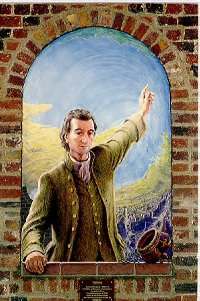See Dissecting Deism Past and Present
Thomas Jefferson's Reasonable Deity
Quoting The Exaltation of a Reasonable Deity: Thomas Jefferson's Critique of Christianity (an extract) by Jeremy Koselak:
Of course Jefferson injected originality into what he learned; but he relied heavily upon the works of...four key philosophers: John Locke, Thomas Paine, Viscount Bolingbroke (Lord Kames), and Joseph Priestley.
Thomas Jefferson's religious philosophy was most heavily influenced by the writings of John Locke. Two works by Locke, A Letter on Toleration (1689) and The Reasonableness of Christianity (1695), specifically shaped Jefferson's bill for establishing religious freedom. Locke presented a philosophical justification for religious toleration, one that Jefferson advocated in his writings and actions.
Locke's belief in toleration, that "no man, even if he would, can believe at another's dictation" induced Jefferson's internalization of religion. Jefferson emulated this doctrine of toleration, advocating that privacy and freedom meant everything in a personal relationship with the Supreme Creator.
Locke coupled his emphasis on toleration with intellectual support of an eventual day of reckoning before a just God, further influencing Jefferson's understanding of religion's role in society. Even though Jefferson rejected many orthodox Christian beliefs, he sided with Locke and whole-heartedly envisioned this day that God alone would evaluate one's life.
It was this belief in the future judgment that naturally led to increased incentives for morality linked to self-interest. The future judgment provided impetus for a society to function cohesively under the premise of universal accountability. Jefferson found this argument both reasonable and necessary to the success of United States (and the world) at large.
Jefferson adapted the reasonable qualities of Locke's argument with the philosophical underpinnings of Thomas Paine's natural theology. Jefferson extensively studied Paine's The Age of Reason and agreed with Paine's convictions that it was a grave injustice to lock God into a sacred text. This understanding of Paine immeasurably influenced Jefferson's dealings with the Bible.
For Paine, the Word of God "IS THE CREATION WE BEHOLD" and through this, "God speaketh universally to man." Jefferson absorbed this naturalism and sought to comprehend God in the laws of the universe, not doctrinal truths locked in scripture.
For both Paine and Jefferson, the God in the Bible did not appeal to reason. That God required complex doctrines and priestly authority to guide in His discovery, excluding many from relating to God on a personal basis. For the reasonable person, the evidence available in creation was all that was necessary. God was not only reachable but also understandable.
Based largely on Paine's influence, Jefferson focused his critique upon such exclusivity, diligently seeking to free Christianity from the darkness.
More influential than both Paine and Locke in terms of Jefferson's critique of Christianity was Joseph Priestley. Jefferson was captivated with Priestlely, a Unitarian minister, and read his History of the Corruptions of Christianity with vigor.
Jefferson claimed that the book was the "groundwork of my view of this subject (corruptions of Christianity)" and in general a major tenet "of my own faith." Priestley's critique of Christianity was founded on the idea that reason and faith should function together to forge a stronger belief system.
By convincing Jefferson that faith and reason could co-exist, Priestley played the critical role of rescuing Jefferson from totally rejecting Christianity. Or, at least, Priestley paved the way for paring away the corruptions, with the result that a reasonable person could be a Christian. Priestley justified a simplistic Christianity, one founded on reason, and Jefferson discovered the merits in the philosophy of Jesus of Nazareth due in large part to Priestley's reasonable defense of faith.
Another major influence upon Jefferson's theological development was Henry St. John, Viscount Bolingbroke. Evidence of Bolingbroke's importance, Jefferson recorded sixty pages in his "Literary Bible" quoting and paraphrasing Viscount Bolingbroke, the longest single entry and the only one specifically about Christianity.
These entries illustrate the most important contribution Bolingbroke made to Jefferson's theology, which was to argue against inspiration of the Bible because it was full of "gross defects and palpable falsehoods...such as no man who acknowledges a supreme all-perfect being can believe to be his [Jesus] word."
Jefferson found merit in this ideology, and his criticism of Christianity reflects Bolingbroke's influence. For both Bolingbroke and Jefferson, those (referring to priests specifically) relying on inspiration and expounding doctrines based on revelation had created an imperfect image of God.
Jefferson defended his rational God consistently on this basis. Adapting the religious ideas of Bolingbroke along with Locke, Paine, and Priestley, Jefferson forged an eclectic faith based on reason that he would build upon his entire life.
Jefferson molded and absorbed these various ideologies (among others) and elevated God to the stature of Rational Creator. As many enlightened reformers of his age rejected God and Christianity alike, Jefferson found a way to justify belief. By simplifying religion and remaining aloof to exclusivistic tendencies, Jefferson produced a rational theology that, although was at times considered outlandish, was not unique or radical.
It may not have exactly fit the bill of orthodox traditionalism, but Jefferson stood amongst powerful company in his perception of a reasonable Deity. For instance, several of the Founding Fathers held an accepted belief in general principles of religion.
These general principles of religion presented a belief structure independent of interpretation. Simple religion, as far as Jefferson and Franklin were concerned, represented what all could agree upon. Jefferson's axiom that "What all agree upon is probably right; what no two agree in most probably is wrong," formed the basic framework of amiability that ultimately characterized his theology.
- Permission to believe (in God) Dr Gerald Schroeder
- Where the Bible meets the Big Bang
- 25 Questions and answers for Creationism
- Introduction to the scientific method.
- Scientific Method
- Evolution and the early church, and Islam
- Christian Orthodoxy On Creationism and Evolution
- Handbook on the History of Modern Science
- Islam Versus Deism
- Left vs Right, Montesquieu, Corporatism
- Eastern Roman Empire and Islam
- Philosophies of Islam, Greece, and the West by Turgut Ozal
- Example of Islam and science.
- Maimonides Versus Aristotle and the Jews of Spain, Thirteen Rules
- Handbook on the History of Modern Science
- Pelagius and why he was right
- Islam Versus Judaism and Christianity
- Islam to Deism: Why I became a Deist
Web site Copyright Lewis Loflin, All rights reserved.
If using this material on another site, please provide a link back to my site.

